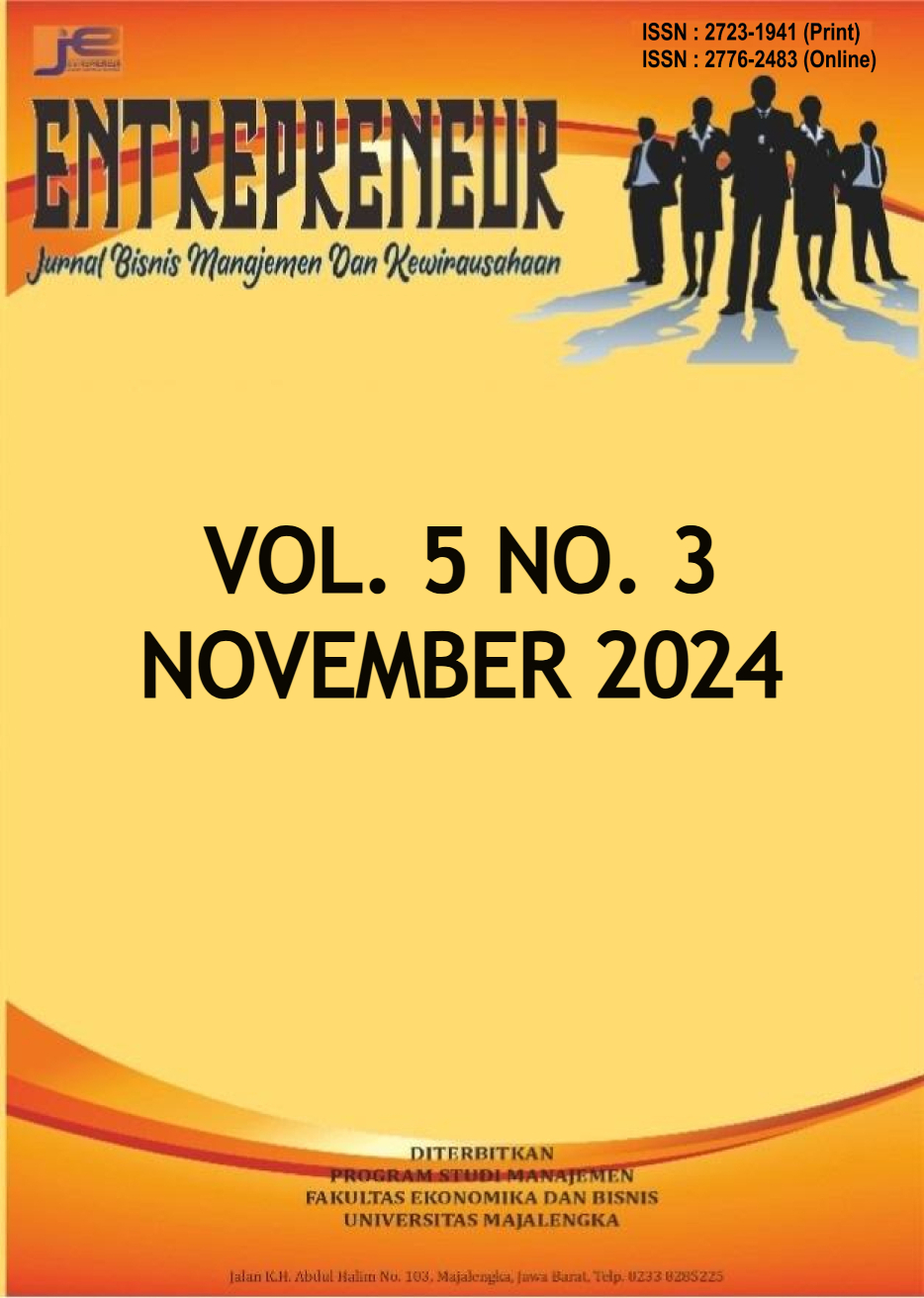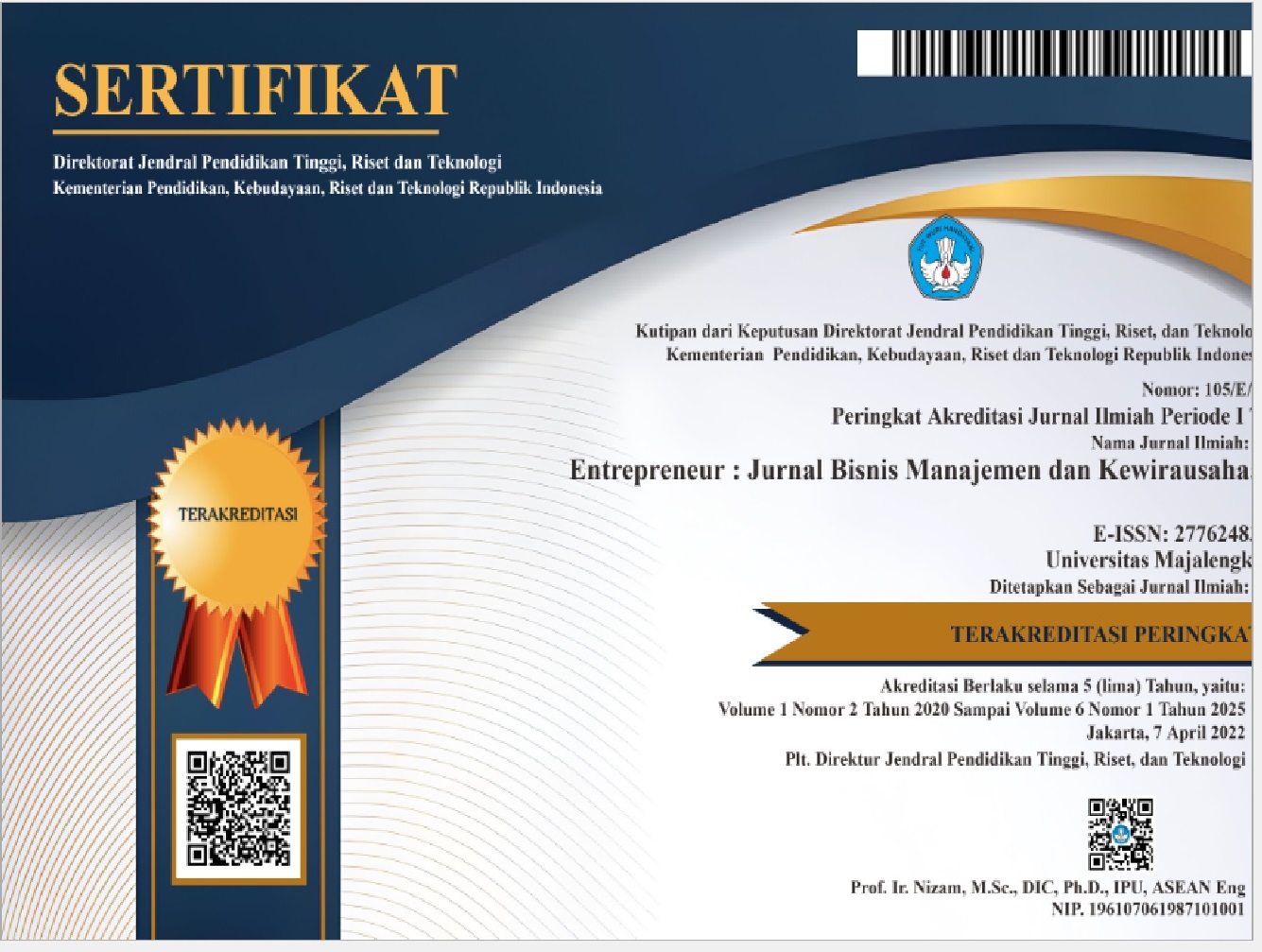Analisis Penerapan Sistem Layanan Administrasi Kependudukan Online (SILAMO)
DOI:
https://doi.org/10.31949/entrepreneur.v5i3.12061Abstract
The Online Population Administration Service System is a system whose service process is carried out in the local village which includes Population Biodata Recording Services, Family Card Issuance Services, Moving In and Out Information Issuance Services, Birth Certificate Issuance Services, Death Certificate Issuance Services, Marriage Certificate Issuance Services, Divorce Certificate Issuance Services, Child Recognition and Validation Certificate Issuance Services, Citizenship Change Certificate Issuance Services, Marriage Cancellation Certificate Issuance Services, Residence Certificate Issuance Services. Many people in the villages do not yet know about the online services provided by the Population and Civil Registration Service of Sumbawa Regency, so many people still come to the office to take care of population documents. This is due to the lack of socialization carried out by the Village regarding the Online Services of the Population and Civil Registration Service of Sumbawa Regency. The purpose of this study was to analyze the Implementation of the Online Population Administration Service System. The quantitative associative research method was used in this study, the technical data analysis in this study used the Method of Successive (MSI). The results of the study show that the implementation of SILAMO makes it easier for the public to access population administration services anytime and anywhere, without having to come to a government office. This makes it very easy, saves time, and reduces transportation costs. The government can more easily provide information quickly and efficiently, and speed up the service process to the public.
Keywords:
Analysis, Implementation, Service System, Administration, PopulationDownloads
References
Azizah, N., Dewi, R. K., & Hoerudin, C. W. (2022). Efektivitas pelayanan publik berbasis teknologi informasi di dinas kependudukan dan pencatatan sipil kabupaten karawang. 1(1), 1–11.
Barata, A. A. (2003). Dasar-dasar pelayanan prima. Elex Media Komputindo. Boediono.
Creswell, John W. 2016. Research Design (Pendekatan Metode Kualitatif, Kuantitatif, dan Campuran). Yogyakarta. Pustaka Pelajar.
Denhardt, J. V, & Denhardt, R. B. (2015). The new public service: Serving, not steering. Routledge.
Moenir, A. S. (2010). Manajemen Pelayanan Umum Di Indonesia. Jakarta: Bumi Aksara. Parasuraman. 1990. Delivering Quality Service. New york: The Free. Press.
Nafisah, A., Marwiyah, S., Studi, P., Administrasi, I., & Marga, U. P. (2023). Efektivitas Pelayanan Admnistrasi Kependudukan Melalui Kanal Website Go Digital ( GODIGI ) Di Mal Pelayanan Publik Kabupaten Probolinggo. 15(3), 507–513.
Rosalina, I. (2019). “Efektivitas Program Nasional Pemberdayaan Masyarakat Mandiri Perkotaan Pada Kelompok Pinjaman Begulir Di Desa Mantren Kec. Karangerejo Kabupaten Madetan”. Jurnal efektivitas Pemberdayaan Masyarakat, Vol.01 No 01 ( 1 februari 2019), h.3. Journal of Chemical Information and Modeling, 53(9), 1689–1699.
Sedarmayanti & Hidayat, S. 2011. Metodologi Penelitian. Bandung : Mandar Maju.
Sinambela, Lijan Poltak. Dkk. 2011. Reformasi Pelayanan Publik. Jakarta: Bumi Aksara.
Sugiyono. 2013. Metode Penelitian Kuantitatif , Kualitatif dan R & D.

Published
How to Cite
Issue
Section
License
Copyright (c) 2024 Kurniawansyah, Wahyu Haryadi, Ismawati, Syafruddin, Sri Rahayu

This work is licensed under a Creative Commons Attribution-ShareAlike 4.0 International License.
COPYRIGHT NOTICE
An author who publishes in the Entrepreneur: Jurnal Bisnis Manajemen dan Kewirausahaan agrees to the following terms:
1. Author retains the copyright and grants the journal the right of first publication of the work simultaneously licensed under the Creative Commons Attribution-ShareAlike 4.0 License that allows others to share the work with an acknowledgment of the work's authorship and initial publication in this journal
2. The author is able to enter into separate, additional contractual arrangements for the non-exclusive distribution of the journal's published version of the work (e.g., post it to an institutional repository or publish it in a book) with the acknowledgment of its initial publication in this journal.
3. The author is permitted and encouraged to post his/her work online (e.g., in institutional repositories or on their website) prior to and during the submission process, as it can lead to productive exchanges, as well as earlier and greater citation of the published work







